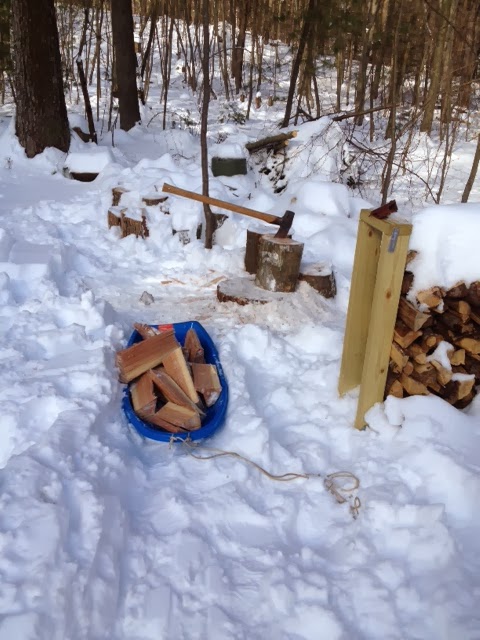 I've written about our winter preparations and keeping the animals healthy in the 6 months of sub-freezing weather we have in New England. It's been a particularly cold winter in Massachusetts. It's currently 2 degrees F and we're expecting another foot of snow.
I've written about our winter preparations and keeping the animals healthy in the 6 months of sub-freezing weather we have in New England. It's been a particularly cold winter in Massachusetts. It's currently 2 degrees F and we're expecting another foot of snow.As the snow gets deeper, the icicles get longer, and all unheated water becomes a solid chunk of ice, how do we manage our weekly work routine on the farm?
Our 15 acres of woodland require constant maintenance - bucking fallen trees, removing broken branches, repairing trails/bridges, splitting wood, and making chip piles.
The new Terex PT30 compact track loader makes this job infinitely easier since I previously used a 6 cubic foot wheelbarrow and heavy duty cart to haul logs, branches, and chips. I've removed trees, brush and rocks along our 1 mile of trails to accommodate the 48" width and 10" ground clearance of the Terex, so I now can reach any portion of the 15 acres with the Terex. Last week, after a foot of snow, I used the Terex to clear working paths through the barnyard, manure management bins, and wood processing area. Every week I split about 1/2 cord of wood by hand, which is challenging to do with a few feet of snow on the ground. My solution is to clear trails with the Terex then use a snow sled to haul wood from the splitting area to the storage area and from the storage area to the fireplaces. "Sledding" on the farm has definitely improved our winter work efficiency. The carts and wheelbarrow are getting a rest until the snow melts.
Manure management (10,000 pounds per year) is challenging at 2 degrees F in two feet of snow. Although the manure is biologically warm, the sub-freezing weather yields a frozen blend of manure, hay and snow. I use an ice chipper to break up the manure in the barn stalls and then move it to a sled dedicated to manure hauling. As you'll see in the pictures below, we have our own bobsled tracks for manure management during the winter. I doubt manure bobsled will ever be an Olympic event.
We have over 100,000 bees at Unity Farm, spread in 8 hives, each with 2 deep hive bodies and 10 frames. We entered the winter with 7 strong hives, and 1 weak hive. Although we stopped harvesting honey in August and left plenty of food stores for the bees in winter, we supplement the hives with bee tea (in a 1 gallon tank that fits in the hive) and fondant. Here are the recipes
Bee Tea
10 cups can sugar
6 cups hot water
fresh or dried chamomile and/or time
1 teaspoon sea salt
Combine sugar and salt. Add hot water and stir thoroughly. Boil 2 cups of water and add herbs. Steep for 10 minutes. Strain and mix into sugar water solution. Cool and feed to bees.
Fondant
5 pounds sugar
1 pint light Karo syrup
1 1/3 cups water
Heat in a saucepan to 242°F while stirring constantly – this mix will be boiling for about 5 to 8 minutes before it reaches 242°F . Take if off the heat and let it sit for about 10 minutes to start the cooling process. You then must start stirring until it completely cools. This will take about 20 minutes. It will get whitish in color and thicken up. Once this happens, then you can pour onto paper plats. Don’t wait too long or you will not be able to pour it and get it to the thickness that you need to put in the hives.
(1/4"). When ready to feed, remove paper, break in half and place both halves on the top of hive frames.
Finally, we think of Unity Farm as part of the Massachusetts agricultural community and immediately volunteered to help in this rescue situation. I'll post additional details as we get more involved.










0 comments:
Post a Comment